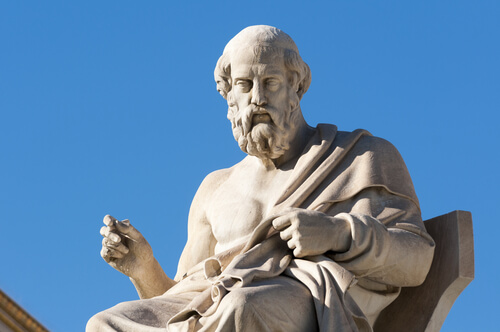Socrates, Biography of the Father of Philosophy

Socrates is one of the most famous men in the history of all humanity. Many think that it was he who gave unity to philosophical activity and that Western thought began to take shape thanks to him. In fact, he’s considered to be the father of philosophy and the greatest of Greek thinkers.
Politics and ethics as areas of thought began with Socrates. He was, above all, a man who liked to question and debate intelligently. Furthermore, he didn’t take anything for granted. However, this made him an object of criticism and persecution. Indeed, very few tolerated his questions. That’s because they tended to expose the fragility of the knowledge and arguments of his contemporaries.
” I know that I know nothing.”
-Socrates-
Socrates also left a great mark on the world with his method of analysis, dialectics, and teaching strategy. This was known as maieutics or the Socratic method. He was a thinker who wasn’t interested in postulating truths, but in scrutinizing the very basis of thought. Furthermore, he was thought to have a terrific sense of humor.

The early years of Socrates
Socrates was born in Athens in 470 BC. His father was called Sofronisco. He was a stonemason and had participated in the construction of the Parthenon. It’s said that when his son was born he consulted the Oracle of Delphi who advised him to let Socrates grow at his own pace, without opposing his will or repressing his impulses. Socrates’ mother was Phaenarete, a midwife, whom the philosopher considered as his mentor.
To start with, Socrates dedicated himself to the same profession as his father. In fact, he sculpted several statues at the entrance to the Acropolis. He received a basic education as was befitting someone of his status. It was Archelaus who introduced him to philosophy.
Socrates was also an infantryman during the Peloponnesian War, in which he fought with great courage. He married young, to Xantipa, a woman who became famous for her bad character. They were thought to have a difficult relationship. However, it’s not clear whether it was as troubled as some believed.
A brilliant yet humble man
Socrates’ physical appearance was a source of ridicule, as he wasn’t handsome. Furthermore, he was terribly austere. In fact, he always wore the same cloak and he led a meager life. However, this was deliberate. In any case, he soon became notable for his great intelligence. In particular, he became famous for his questions.
His method, maieutics, consisted in formulating one question after another. In this way, a coherent discursive thread of answers was established. He soon became famous in Athens for his ability to delve into any subject. For this reason, he gathered many followers.
As a matter of fact, what Socrates was doing, was questioning “the certainties.” Indeed, his followers loved him, due to the fact that they could actively participate in the construction of knowledge and ideas.
His most brilliant student was Plato. In fact, it was thanks to the latter that a good part of Socratic thought was recovered. Because the father of philosophy never wrote.

A historical crime
The philosopher who made everyone doubt everything wasn’t viewed favorably by those who tried to impose absolute truths. Indeed, Socrates wasn’t liked by the powerful.
It’s said that a wealthy Athenian wanted to hire him to educate his son. The philosopher asked him for a payment of 500 drachmas. However, this seemed excessive to the contractor. In fact, he claimed that he could buy the donkey with the money. Socrates advised him to buy it so he’d then have two donkeys in the house.
At the height of his fame, Socrates began to be viewed with suspicion. In fact, he was accused of being a bad influence on the young. To everyone’s surprise, he didn’t defend himself with his great dialectical capacity. Because he thought that the laws and the judges’ rulings should be complied with, whether he agreed with them or not.
Socrates was sentenced to die of hemlock poisoning. Xantipa, his wife, is said to have visited him and began to cry.
The philosopher asked her why she was lamenting and she replied that it was extremely sad to see him die from a wrongful conviction. He replied, “Would you feel better if I died for a just sentence?” Understandably, his death caused an uproar among his followers.
Socrates is one of the most famous men in the history of all humanity. Many think that it was he who gave unity to philosophical activity and that Western thought began to take shape thanks to him. In fact, he’s considered to be the father of philosophy and the greatest of Greek thinkers.
Politics and ethics as areas of thought began with Socrates. He was, above all, a man who liked to question and debate intelligently. Furthermore, he didn’t take anything for granted. However, this made him an object of criticism and persecution. Indeed, very few tolerated his questions. That’s because they tended to expose the fragility of the knowledge and arguments of his contemporaries.
” I know that I know nothing.”
-Socrates-
Socrates also left a great mark on the world with his method of analysis, dialectics, and teaching strategy. This was known as maieutics or the Socratic method. He was a thinker who wasn’t interested in postulating truths, but in scrutinizing the very basis of thought. Furthermore, he was thought to have a terrific sense of humor.

The early years of Socrates
Socrates was born in Athens in 470 BC. His father was called Sofronisco. He was a stonemason and had participated in the construction of the Parthenon. It’s said that when his son was born he consulted the Oracle of Delphi who advised him to let Socrates grow at his own pace, without opposing his will or repressing his impulses. Socrates’ mother was Phaenarete, a midwife, whom the philosopher considered as his mentor.
To start with, Socrates dedicated himself to the same profession as his father. In fact, he sculpted several statues at the entrance to the Acropolis. He received a basic education as was befitting someone of his status. It was Archelaus who introduced him to philosophy.
Socrates was also an infantryman during the Peloponnesian War, in which he fought with great courage. He married young, to Xantipa, a woman who became famous for her bad character. They were thought to have a difficult relationship. However, it’s not clear whether it was as troubled as some believed.
A brilliant yet humble man
Socrates’ physical appearance was a source of ridicule, as he wasn’t handsome. Furthermore, he was terribly austere. In fact, he always wore the same cloak and he led a meager life. However, this was deliberate. In any case, he soon became notable for his great intelligence. In particular, he became famous for his questions.
His method, maieutics, consisted in formulating one question after another. In this way, a coherent discursive thread of answers was established. He soon became famous in Athens for his ability to delve into any subject. For this reason, he gathered many followers.
As a matter of fact, what Socrates was doing, was questioning “the certainties.” Indeed, his followers loved him, due to the fact that they could actively participate in the construction of knowledge and ideas.
His most brilliant student was Plato. In fact, it was thanks to the latter that a good part of Socratic thought was recovered. Because the father of philosophy never wrote.

A historical crime
The philosopher who made everyone doubt everything wasn’t viewed favorably by those who tried to impose absolute truths. Indeed, Socrates wasn’t liked by the powerful.
It’s said that a wealthy Athenian wanted to hire him to educate his son. The philosopher asked him for a payment of 500 drachmas. However, this seemed excessive to the contractor. In fact, he claimed that he could buy the donkey with the money. Socrates advised him to buy it so he’d then have two donkeys in the house.
At the height of his fame, Socrates began to be viewed with suspicion. In fact, he was accused of being a bad influence on the young. To everyone’s surprise, he didn’t defend himself with his great dialectical capacity. Because he thought that the laws and the judges’ rulings should be complied with, whether he agreed with them or not.
Socrates was sentenced to die of hemlock poisoning. Xantipa, his wife, is said to have visited him and began to cry.
The philosopher asked her why she was lamenting and she replied that it was extremely sad to see him die from a wrongful conviction. He replied, “Would you feel better if I died for a just sentence?” Understandably, his death caused an uproar among his followers.
All cited sources were thoroughly reviewed by our team to ensure their quality, reliability, currency, and validity. The bibliography of this article was considered reliable and of academic or scientific accuracy.
Taylor, A. E., & Barroso, M. H. (1961). El pensamiento de Sócrates (No. 04; B316, T3.). Fondo de Cultura Económica.
This text is provided for informational purposes only and does not replace consultation with a professional. If in doubt, consult your specialist.







